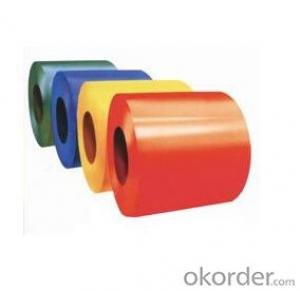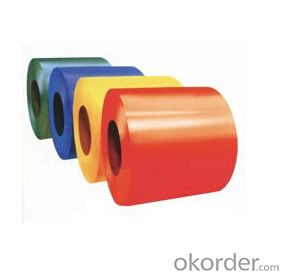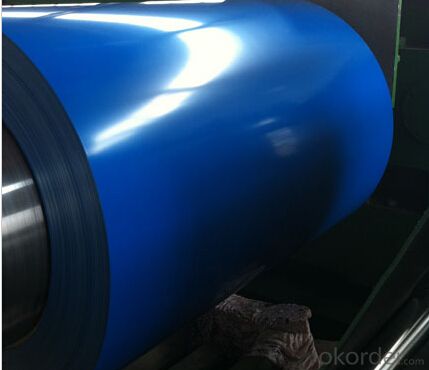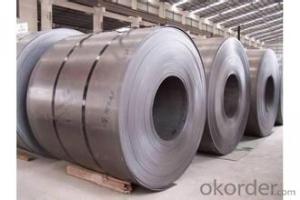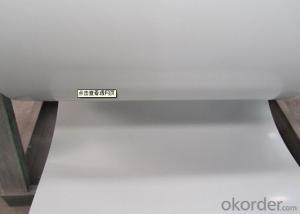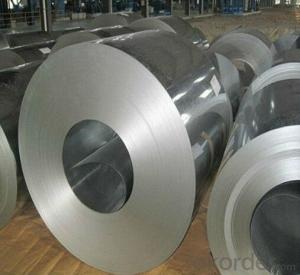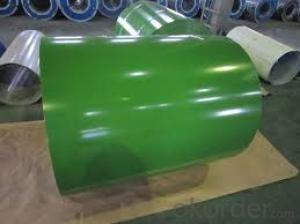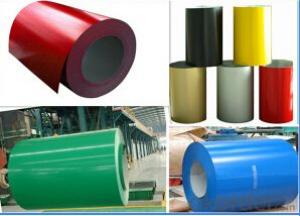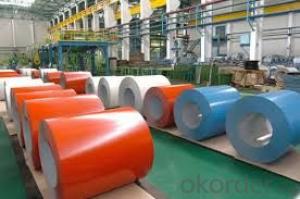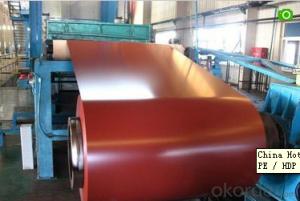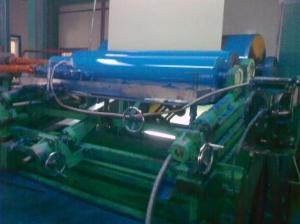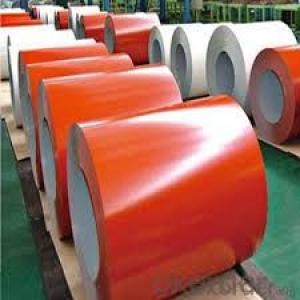Prepainted Steel Coil PPGI (0.16-1.2)*(900-1250)
- Loading Port:
- Tianjin
- Payment Terms:
- TT OR LC
- Min Order Qty:
- 50 m.t.
- Supply Capability:
- 10000 m.t./month
OKorder Service Pledge
OKorder Financial Service
You Might Also Like
Basic Info.
Model NO.:(0.16-1.2)*(900-1250)
Surface Treatment:Coated
Technique:Galvanized Steel
Standard:ASTM, JIS, GB
Steel Grade:Q235B
Export Markets:Global
Additional Info.
Packing:Standard Export Package
Standard:Thickness: 0.16-1.0
Origin:China
Production Capacity:100,000 MT/YEAR
Specifications
Prepainted galvanized steel coil
1. Thickness: 0.13mm-1.0mm
2. Width: 600mm-1250mm
3. Zinc coated: 30g-120g
4. MOQ: 25 tons
we know how to properly handle every step of production. Manufacture galvanized steel, pre-painted galvanized steel
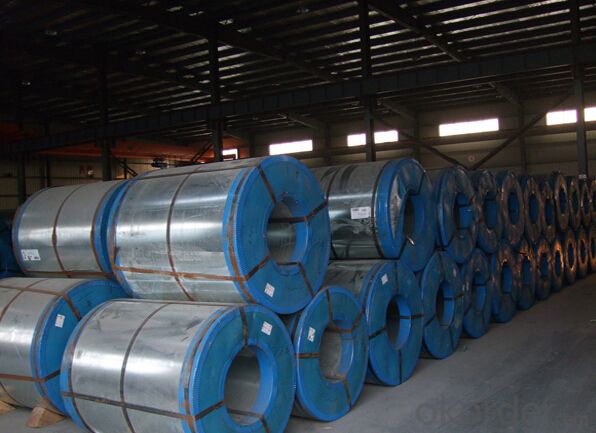
FAQ:
Acceptable payment term and way?
T/T,L/C, T/T + L/C, D/P
Acceptable price term
FOB CNF CIF DDU CPT
Do you accept OA payment terms?
Yes, sure, but it normally depending on the order value
Do you have QC team?
Yeah, sure, our QC team is very important, they will keep the qualitycontrol for our products.
What is the validity of your quotation?
Normally 7 days.
What is your advantage?
24 hour quick response /Customer oriented/ Credit foremost/ Top quality Excellent
What is your acceptable payment term?
TT,LC,OA etc
- Q: What is the average shelf life of a steel coil?
- The average shelf life of a steel coil can vary depending on various factors such as the type of steel, storage conditions, and maintenance practices. However, on average, a steel coil can have a shelf life of around 6 to 12 months if stored properly in a controlled environment with suitable temperature, humidity, and protection from corrosion. Regular inspection and maintenance can extend the shelf life of a steel coil further.
- Q: What are the common coil thicknesses available for steel coils?
- The common coil thicknesses available for steel coils range from 0.15mm to 25mm, depending on the specific requirements and applications.
- Q: steel strutural
- how much of IS2062-92
- Q: I expect that I will be questioned about my knowledge in methoding for steel castings, in a interview. I dont know about it. Can someone explain me in simple language and give me some links, like how I can explain methoding for steel castings.....key points...help please...so that i will pass the interview as if I have experience in methoding....thanks
- It is very difficult to define Methoding of Steel castings by one sentence. Actually it encompasses the total casting process. Normally it would mean a) Pattern design i.e. what type of pattern it would be- wooden, metallic, split or full, loose or fitted on a match plate or any other, how will be the parting line. b) Design of the gating system. c) Design of risering i.e. numbers, size and location of risers. d) Design of molding process i.e. sand system to be used, mold box size. But to do justice to the above mentioned activities, you need to consider other parameters of the casting process such as chemical composition, solidification characteristics, pouring temperature, pouring time, knock out time etc. As I said Methoding of Steel castings means designing of the total casting process from inception to final product.
- Q: How are steel coils used in the production of transportation equipment?
- Steel coils are used in the production of transportation equipment as they provide the necessary strength and durability required for components such as chassis, frames, and body panels. These coils are shaped, cut, and welded to create different parts, ensuring the structural integrity and safety of vehicles such as cars, trucks, and trains.
- Q: What are the different types of steel coil finishing tools?
- There are several different types of steel coil finishing tools used in the metalworking industry. These tools are designed to add various finishes to steel coils, enhancing their appearance and functionality. Some of the common types of steel coil finishing tools include: 1. Slitting Machines: These tools are used to cut large steel coils into narrower strips. Slitting machines have sharp circular blades that can efficiently slice through the coil, resulting in multiple smaller coils of desired widths. 2. Levellers: Levellers are used to flatten and straighten steel coils. They apply pressure to the coil, ensuring that it is perfectly flat and even. Levellers are particularly useful when the steel coils have undergone deformation during the manufacturing process. 3. Recoilers: Recoilers are used to rewind steel coils into a tighter and more compact shape. These tools are typically used after slitting or levelling to create coils of a specific diameter or size. 4. Edge Trimmers: Edge trimmers are used to remove any excess or uneven edges from the steel coils. They can remove burrs, rough edges, or any other imperfections, resulting in a clean and smooth finish. 5. Inspection Machines: Inspection machines are used to examine the quality of the steel coils. These tools can detect any defects, such as surface imperfections, scratches, or dents, ensuring that only high-quality coils are delivered to customers. 6. Coating Machines: Coating machines are used to apply protective coatings to steel coils. These coatings can be in the form of paint, zinc, or other materials, preventing corrosion and enhancing the durability of the coils. 7. Packaging Machines: Packaging machines are used to wrap the steel coils securely and protect them during transportation and storage. These machines can apply plastic or metal straps, shrink wrap, or other packaging materials to ensure the coils remain intact and undamaged. Overall, these different types of steel coil finishing tools play a vital role in the metalworking industry, allowing manufacturers to produce high-quality and visually appealing steel coils that meet the specific requirements of their customers.
- Q: What are the different methods of blanking steel coils?
- There are several methods for blanking steel coils, including shearing, laser cutting, and waterjet cutting. Shearing involves using sharp blades to cut the coil into desired shapes. Laser cutting utilizes a high-powered laser beam to accurately cut through the steel. Waterjet cutting involves the use of a high-pressure stream of water mixed with abrasive materials to cut the coil. These methods offer different levels of precision, speed, and cost-effectiveness depending on the specific requirements of the blanking process.
- Q: What are the common methods of welding steel coils?
- The common methods of welding steel coils include arc welding, resistance welding, and laser welding.
- Q: any one have an opinion? i've heard steel cut oatmeal is better for you...
- Steel cut oats have health benefits. They are delicious and very good for you! The difference between regular oatmeal and steel cut oatmeal: Steel-Cut Oats are whole grain groats (the inner portion of the oat kernel) which have been cut into two or three pieces using steel discs. Golden in colour and resembling mini rice particles, they are as nature intended - nothing added and nothing taken out. Rolled oats are flake oats that have been steamed, rolled, re-steamed and toasted. Due to all of this additional processing they have lost some of their natural taste, goodness and texture.
- Q: How are steel coils inspected for weldability?
- Steel coils are inspected for weldability through a series of comprehensive tests and examinations. The main objective of this inspection is to assess the quality and suitability of the steel coils for welding processes. Firstly, visual inspection is conducted to identify any visual defects or irregularities on the surface of the coils. This includes checking for surface roughness, cracks, scratches, or any other imperfections that may affect the weldability. Next, destructive testing methods such as tensile testing and impact testing are performed. Tensile testing measures the strength and ductility of the steel, ensuring it meets the required mechanical properties for welding. Impact testing evaluates the steel's resistance to brittle fracture, which is crucial in determining its weldability. Furthermore, non-destructive testing techniques such as ultrasonic testing (UT) and magnetic particle inspection (MPI) are employed to detect internal defects and discontinuities. UT uses high-frequency sound waves to identify any hidden flaws within the steel, while MPI utilizes magnetic particles to identify surface and near-surface defects. Additionally, chemical analysis is carried out to determine the steel's composition and ensure it meets the required specifications for welding. This analysis involves checking the levels of carbon, manganese, sulfur, and other elements that may affect the weldability and overall performance of the steel. Moreover, weldability testing is performed to evaluate the steel's response to welding processes. This involves conducting various welding trials using different techniques and parameters to determine the steel's behavior during welding, such as its susceptibility to cracking, distortion, or other welding-related issues. Overall, the inspection of steel coils for weldability is a multi-faceted process that combines visual, destructive, non-destructive, chemical, and weldability testing methods. By conducting these thorough inspections, manufacturers can ensure that the steel coils meet the required standards and are suitable for welding applications.
Send your message to us
Prepainted Steel Coil PPGI (0.16-1.2)*(900-1250)
- Loading Port:
- Tianjin
- Payment Terms:
- TT OR LC
- Min Order Qty:
- 50 m.t.
- Supply Capability:
- 10000 m.t./month
OKorder Service Pledge
OKorder Financial Service
Similar products
Hot products
Hot Searches
Related keywords
